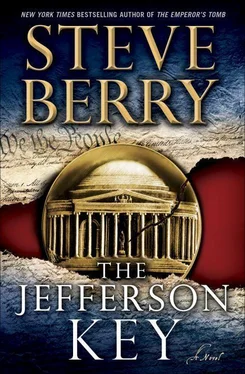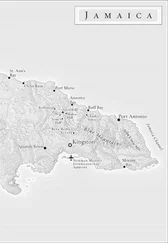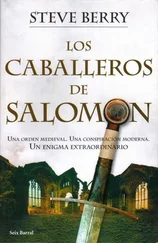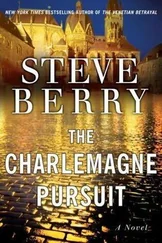Steve Berry - The Jefferson Key
Здесь есть возможность читать онлайн «Steve Berry - The Jefferson Key» весь текст электронной книги совершенно бесплатно (целиком полную версию без сокращений). В некоторых случаях можно слушать аудио, скачать через торрент в формате fb2 и присутствует краткое содержание. Жанр: Триллер, на английском языке. Описание произведения, (предисловие) а так же отзывы посетителей доступны на портале библиотеки ЛибКат.
- Название:The Jefferson Key
- Автор:
- Жанр:
- Год:неизвестен
- ISBN:нет данных
- Рейтинг книги:3 / 5. Голосов: 1
-
Избранное:Добавить в избранное
- Отзывы:
-
Ваша оценка:
- 60
- 1
- 2
- 3
- 4
- 5
The Jefferson Key: краткое содержание, описание и аннотация
Предлагаем к чтению аннотацию, описание, краткое содержание или предисловие (зависит от того, что написал сам автор книги «The Jefferson Key»). Если вы не нашли необходимую информацию о книге — напишите в комментариях, мы постараемся отыскать её.
The Jefferson Key — читать онлайн бесплатно полную книгу (весь текст) целиком
Ниже представлен текст книги, разбитый по страницам. Система сохранения места последней прочитанной страницы, позволяет с удобством читать онлайн бесплатно книгу «The Jefferson Key», без необходимости каждый раз заново искать на чём Вы остановились. Поставьте закладку, и сможете в любой момент перейти на страницу, на которой закончили чтение.
Интервал:
Закладка:
People started digging.
First McGinnis and his friends, then others, then organized treasure consortiums. They bore down nearly two hundred feet and found layers of charcoal, timber, coconut fibers, flagstones, and clay. If their accounts could be believed, they unearthed a strange stone with curious markings. Two ingenious flood tunnels tied into the shaft, designed to ensure that anyone who dug deep enough would encounter nothing but water.
And that was exactly what they found.
Flooding had thwarted every attempt to solve the mystery.
Countless theories abounded.
Some said it was a pirate cache, dug by Captain William Kidd himself. Others gave ownership to the privateer Sir Francis Drake or the Spanish, as an out-of-the-way place to stash their wealth. More pragmatic people suggested military involvement-pay chests concealed by the French or English in their seesawing struggle to control Nova Scotia.
Then there were the far-outers.
Antediluvian Atlanteans, interplanetary travelers, Masons, Templars, Egyptians, Greeks, Celts.
Several men lost their lives, many their fortunes, but no treasure had ever been found.
Oak Island wasn’t even an island any longer. A narrow causeway, built to allow heavy digging equipment to easily pass back and forth, now connected it to the mainland. One recent Canadian news article mentioned that the provincial government was considering buying the land and turning the place into a tourist attraction.
Now that would yield a treasure, he thought.
He located a few mentions of Paw Island, a few miles southeast of Oak. About a mile long, and half that wide, shaped liked its name. Two coves indented its center facing north, while smaller ones cracked the remaining shoreline. Its rounded west side was covered with trees, while rocky cliffs dominated the east and south shores. The French had explored it in the 17th century looking for furs, but the English had built a fort, which they dubbed Wildwood, that faced the Atlantic and guarded the bay. He read how Nova Scotia was generally devoid of ruins. Nothing was ever wasted. Houses were dismantled timber by timber, the hinges, door handles, nails, bricks, mortar, and cement all reused. Twenty-first-century boards, driven by 18th-century nails, over 19th-century joists, was how one site described it.
But the limestone fort on Paw Island stood as an anomaly.
And history was the explanation.
In 1775 when the American Continental army invaded, seizing control of the British forts, Wildwood was taken early and renamed Dominion. But the Americans were soon defeated at the Battle of Quebec and withdrew from Canada in 1776. Before leaving Paw Island, though, they torched the fort. Nothing was ever rebuilt, the site abandoned to the elements, the fire-blackened walls left standing as a reminder of the insult.
Now only birds occupied them.
“Mr. Malone,” a voice said over the intercom. “We have a weather delay. They’re asking us to hold on the runway.”
“I didn’t think those rules applied to the Secret Service.”
“Unfortunately, there’s a nasty storm between here and Maine and even the Secret Service has to bow to that.”
“Keep in mind, we’re in a hurry.”
“It could be a little bit. They didn’t sound encouraging.”
He tapped the keyboard and found a map of Mahone Bay, deciding how best to arrive on Paw Island. They would be landing at a small airstrip to the south, specifically avoiding Halifax and its international hub, since Wyatt could be traveling through there. The Secret Service had run a check of all flights to Nova Scotia, but no seats had been booked in Wyatt’s name. No surprise. He was surely flying under an alias with a clean ID, or he may have chartered something.
It didn’t matter.
He wanted his adversary to have a clear run to the island.
There, they would get reacquainted.
FIFTY-FOUR
CASSIOPEIA FOLLOWED EDWIN DAVIS INTO A ROOM NOT MUCH larger than a closet. Inside was a small table that supported a console with an LCD monitor. The screen displayed a room dotted with oil portraits dominated by a conference table, whose seats were rapidly filling with men and women. She’d returned with Davis to Washington. Later, she’d head back south to Fredericksburg to make use of Kaiser’s phone tap.
“He had me order them here,” Davis said, pointing to the screen. “Heads of the eighteen largest intelligence agencies. CIA, NSA, NIA, Defense Intelligence, National Counter-Terrorism, Homeland Security, Foreign Terrorist Asset Tracking, National Geospatial, Underground Facility Analysis-you name it, we have somebody spending money on it.”
“Bet they’re wondering what’s going on.”
Davis smiled. “These people don’t like surprises, or one another for that matter.”
She watched on the screen as the president of the United States burst into the room and moved out of view to the head of the table. The camera had apparently been installed behind where he sat so only the participants would be recorded.
Everyone sat.
“It’s good to see you’re okay,” one of the participants said to Daniels.
“It’s good to be okay.”
“Mr. President, we had little notice of this meeting so nothing has been prepared. We weren’t even told of the subject matter.”
“Head of Central Intelligence,” Davis told her. “The president owes me five dollars. I bet he’d be the first to probe. He said NSA.”
“You people love to tell me how good you are,” Daniels said. “That this country would be in dire jeopardy if we didn’t spend billions of dollars every year on what you do. You also like to hide behind that secrecy you so righteously demand. I don’t have the luxury of working in secret. I have to do what I do with a cadre of reporters camped out less than a hundred feet away from where I work. Hell, I don’t even know where half of your offices are located, much less what you do.”
“Do they know we’re watching?” she asked.
Davis shook his head. “Pinhole camera. The Secret Service installed it a few years ago. Nobody knows but senior staff.”
“This monstrosity of government called homeland security,” the president said, “is absurd. I have yet to find anyone who knows how much it costs, how many are employed, how many programs there are and, most important, how much duplication there is. Best I can tell there are nearly 1300 separate organizations working homeland security or foreign intelligence. That’s on top of nearly 2000 private contractors. Nearly 900,000 hold a top secret clearance. How could anything possibly be kept secret with that many eyes and ears?”
No one said a word.
“Everyone said they were going to streamline things after 9/11. You folks swore you were finally going to start working together. What you did was create 300 new intelligence organizations. You produce over 50,000 intelligence reports each year. Who reads them all?”
No answer.
“That’s right. No one does. So what good are they?”
“He’s going right for their throats,” she said to Davis.
“It’s all they understand.”
“I want to know who hired Jonathan Wyatt and had him in New York yesterday,” the president asked, breaking the room’s silence.
“I did.”
“Is that her?” Cassiopeia asked.
Davis nodded. “Andrea Carbonell. Head of NIA.”
She’d noticed the woman’s entrance, her swarthy complexion, dark hair, and Latino influences similar to her own. “What’s her story?”
“Daughter of Cuban immigrants. Born here. She worked her way up through the ranks until finally snagging the head of NIA. Her service record is actually exemplary, except for her ties to the Commonwealth.”
Читать дальшеИнтервал:
Закладка:
Похожие книги на «The Jefferson Key»
Представляем Вашему вниманию похожие книги на «The Jefferson Key» списком для выбора. Мы отобрали схожую по названию и смыслу литературу в надежде предоставить читателям больше вариантов отыскать новые, интересные, ещё непрочитанные произведения.
Обсуждение, отзывы о книге «The Jefferson Key» и просто собственные мнения читателей. Оставьте ваши комментарии, напишите, что Вы думаете о произведении, его смысле или главных героях. Укажите что конкретно понравилось, а что нет, и почему Вы так считаете.











